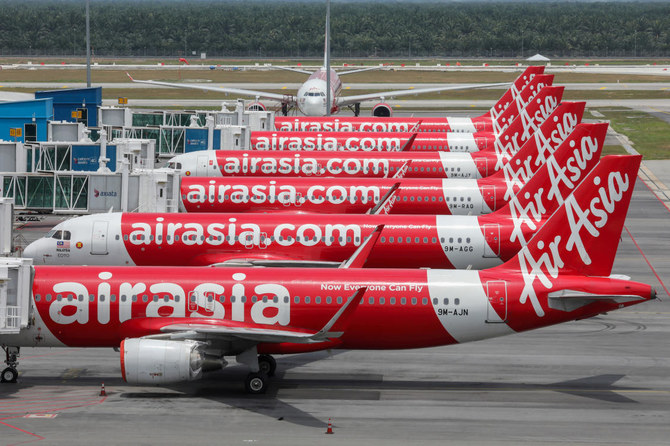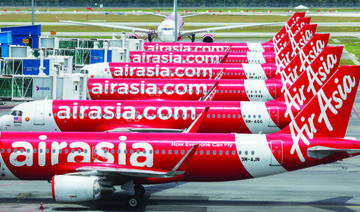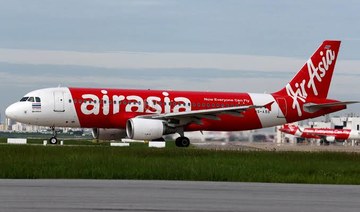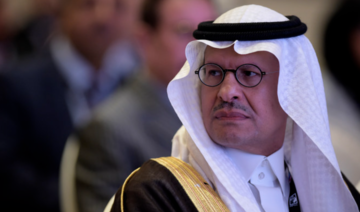KUALA LUMPUR: Most of AirAsia X Bhd (AAX)’s lessors support a restructuring plan, and the Malaysian airline has received interest from potential investors for fundraising after reorganization, court documents filed this month show.
In emails attached to the court filings, supportive lessors said they wanted to continue discussions with the budget airline and potential new investors, seeking more equitable terms and new commercial arrangements.
The affidavits come after more than a dozen creditors filed to intervene with its proposed court-supervised restructuring, with lessor BOC Aviation Ltd. and airport operator Malaysia Airports Holdings Bhd arguing that AAX is “hopelessly insolvent.”
Planemaker Airbus also filed a lawsuit last month saying it could lose more than $5 billion worth of aircraft orders if the low-cost, long-haul carrier proceeded with the plan.
AAX’s senior legal counsel, Shereen Ee, said in court documents seen by Reuters that 15 out of 20 aircraft lessors were not in favor of AAX liquidating, and three other interveners – Airbus, Rolls-Royce Group and BNP Paribas – were “not objecting” to the restructuring plan.
Lessors in favor of a restructuring include Macquarie Aircraft Leasing Services and Aircastle, according to the documents. Rolls-Royce, Macquarie Aircraft Leasing Services and Aircastle did not immediately respond to requests for comment.
An Airbus spokesman declined to comment, saying that the company was continuing discussions but that the details are confidential. AirAsia X also declined to comment.
BNP Paribas – which is a trustee acting on a creditor’s instructions – declined to comment.
Aircastle Asia Pacific executive vice president Nigel Harwood told AAX in an email that his firm was not seeking liquidation of the airline, according to the court filings.
“We look forward to working with you to arrive at a revised commercial arrangement once we understand your future business plan with the introduction of new investors,” he said.
Macquarie’s email said it was willing to support a recapitalized AAX and make a restructured lease agreement on condition that the airline has a detailed business plan, credible third-party investors and that lessors have a meaningful say, according to the filings.
AAX said it had received 10 letters from Malaysian and Singaporean corporations and high net worth individuals indicating interest to participate in its proposed fundraising exercise, according to an affidavit.
The 10 includes Tune Group Sdn Bhd, owned by AirAsia Group Bhd co-founders Tony Fernandes and Kamarudin Meranun. Tune is the largest AAX shareholder, with a 17.83 percent stake.
AAX said it also received interest from a public-listed financial group and the subsidiary of another, both preferring to be unnamed.
AAX, an affiliate of AirAsia Group, last month said it planned to raise up to $49.49 million by issuing shares to new investors after its debt restructuring.
The airline is seeking to restructure $15.87 billion of debt. Its accrued debt amounts to $554.28 million, without taking into consideration contingent debts such as its large aircraft order book with Airbus.
Some lessors have argued the Airbus orders should be excluded. However, AAX said the contingent debts must be dealt with and will be reduced by the re-negotiated leases and other commercial contracts.
AAX estimated that lessors that continue with the airline post-restructuring would be able to recover approximately 44 percent-66 percent of their lease rental loss under new agreements.
AirAsia X shows court creditors’ support for restructuring plan
https://arab.news/43f7p
AirAsia X shows court creditors’ support for restructuring plan

- Supportive lessors said they wanted to continue discussions with the budget airline and potential new investors
Egypt’s Suez Canal Economic Zone secures $3.2bn in project contracts: chairman

RIYADH: Egypt’s Suez Canal Economic Zone secured 144 projects worth $3.2 billion between July 2023 and April 2024, down from $4.9 billion recorded during July 2022 to May 2023.
This comes amidst ongoing attacks in the Red Sea since October, leading to significant global economic disruption, particularly affecting container shipping traffic and global trade.
This is evident in a 50 percent drop in Suez Canal trade in the first two months of 2024 compared to the previous year, and a 32 percent decrease in trade through the Panama Canal, as reported by the International Monetary Fund in a March blog post.
In a statement issued by the Egyptian Cabinet, Walid Gamal El-Din, chairman of the General Authority for the Suez Canal Economic Zone, revealed that out of the 144 projects in its industrial zones and ports, 67 have obtained final approvals, while 77 have received initial approvals.
He added that more than 25,000 direct and indirect job opportunities will be created upon the completion and operation of these projects.
This reflects the authority’s ongoing efforts and activities despite the negative impact of regional developments on port revenues.
It also aligns with the entity’s mission to attract businesses from around the region by offering easy access to local markets and talent.
Furthermore, the chairman disclosed that the implementation rates of investment projects within the industrial zones reached 77 percent, while those in ports reached 71 percent.
Regarding Chinese investments in the special economic zone TEDA, El-Din explained that there are 42 existing projects, with an additional 12 projects under construction awaiting operating licenses. Additionally, 40 projects are currently in the process of completing procedures to obtain building licenses.
On green hydrogen projects, the chairman highlighted that between January and April, 12 framework agreements and six memorandums of understanding were signed, with an additional MoU set to be signed soon.
Furthermore, El-Din provided insights into the development work progress in the authority’s ports, noting a 94 percent implementation rate in Ain Sokhna Port, 86 percent in East Port Said Port, and 93.8 percent in West Port Said Port.
Additionally, he mentioned a 73.7 percent implementation rate in Al-Arish Port and 75 percent in the West Qantara West zone.
Moreover, the chairman reviewed the ship bunkering operations and marine services at the authority’s ports. He noted that the body implemented the first ship bunkering operation with green fuel in East Port Said Port in August 2023.
He also highlighted that the development work of the East Ismaili Zone has reached 100 percent implementation of some works.
About 15 percent of world shipping traffic transits via the Suez Canal, the shortest shipping route between Europe and Asia. The Suez Canal is also an important source of foreign currency for Egypt.
Boeing focuses on quality management enhancement amidst safety concerns, says top official

RIYADH: Aerospace giant Boeing is enhancing its quality management system to meet regulatory standards, ensuring passenger safety, a top official told Arab News.
Speaking on the sidelines of the Future Aviation Forum in Riyadh, Omar Arakat, vice president of commercial sales and marketing of Boeing in the Middle East and Africa, said that the company is putting “a lot of emphasis” to meet the safety standards proposed by regulators.
The US plane maker is revamping its management in response to increasing pressure from airlines, regulators, and investors as it faces a deepening crisis following a mid-air panel blowout on a 737 MAX plane in January.
An Alaska Airlines Boeing 737-9 MAX experienced a mid-cabin exit door panel blowout shortly after takeoff, triggering multiple investigations, including one by the Federal Aviation Administration in the US.
When asked about safety developments, Arakat said: “I’m assuming you are referring to the quality issues that have made headlines, and I assure you that Boeing’s number one priority is safety and quality. We are doing a lot of plans to strengthen our quality management system.”
He added: “We’re also sharing with our customers all the steps that were taken to make sure that they feel the comfort that Boeing is doing the right thing.”
Detailing Boeing’s initiatives to enhance safety standards, Arakat added that the company is directly engaging with its suppliers and increasing involvement by inspecting various stages in the aircraft production cycle.
He expressed his enthusiasm about the progress in Saudi Arabia’s aviation sector during the discussion.
“We are very optimistic, and we are very excited about what is going on in Saudi Arabia in general, and specifically within the aviation sector. There is a lot of commitment by the leadership of Saudi Arabia to support aviation, and they recognize it as one of the most important pillars of developing infrastructure and moving forward,” said Arakat.
He added: “If you look at the mandates of Vision 2030, it really indicates that aviation has a very bright future because it sets some very real targets that the Kingdom is very serious about achieving. We are very proud to be part of that.”
The executive further noted that Boeing’s relationship with Saudi Arabia spans over seven decades, during which the company has delivered over 240 aircraft to airlines operating in the Kingdom.
Last year, Riyadh Air, owned by the Public Investment Fund, announced ordering up to 72 Boeing 787-9 Dreamliner airplanes in a significant deal. This included 39 confirmed aircraft and an option for an additional 33 wide-body 787-9 Dreamliners, reflecting Saudi Arabia’s ambitions to establish itself as a prominent player in global aviation.
National carriers collectively announced plans to purchase up to 121 787 Dreamliners, marking one of Boeing’s largest commercial orders by value.
Energy security is vital for prosperity among Arab citizens, says top official

RIYADH: A comprehensive and integrated approach is needed to ensure energy security amongst citizens, according to the Assistant Secretary-General and Head of the Economic Affairs Sector at the Arab League, Ali Al-Maliki.
During the 12th celebration of Arab Energy Efficiency Day, Al-Maliki urged the adoption of new measures to address this critical issue.
“Energy security is a fundamental issue due to its direct impact on economic growth, national security, and the well-being of all Arab citizens,” he stated in a speech delivered on his behalf by the Director of the Energy Department at the General Secretariat of the Arab League, Jamila Mattar.
“We are all aware of the challenges we face in terms of energy security and the transition to more sustainable sources,” the speech said.
“To confront these challenges, the world needs to adopt a comprehensive and integrated approach to energy security that takes into account the need to increase energy efficiency, develop renewable energy, protect vital energy infrastructure, and work to reduce harmful carbon emissions,” the text added.
Al-Maliki emphasized that efficiency is one of the basic pillars of energy security, according to a report by Bahrain News Agency.
He noted that achieving energy security involves providing services at the lowest cost without compromising quality and managing demand by introducing various concepts related to efficiency.
This approach aims to reduce consumption without conflicting with the developmental plans of each country.
Al-Maliki highlighted the council’s efforts to monitor the stages of efficiency in the Arab region. This includes developing, implementing, and monitoring national efficiency plans.
The council has also prepared the Renewable Energy and Energy Efficiency Guide in Arab Countries, which provides statistical information on policies and programs adopted in nations to enhance the efficiency of production and consumption and the use of renewables.
Additionally, the guide details the institutional and legal frameworks and the necessary financial incentives implemented or planned in these fields.
Saudia orders additional 105 aircraft from Airbus

RIYADH: Saudia Group has signed an order for an additional 105 A320neo family aircraft, marking the largest aircraft deal with Airbus in the Kingdom’s history.
Announced at the Future Aviation Forum in Riyadh, the order comprises 12 A320neo and 93 A321neo aircraft, and increases Airbus aircraft order backlog from the Saudi Arabia’s national flag carrier to 144 A320neo family aircraft.
Saudia Group is set to receive the first aircraft in the first quarter of 2026. These aircraft will be distributed between Saudia and flyadeal, the group's low-cost carrier.
The agreement was announced in the presence of Minister of Transport and Logistic Services Saleh bin Nasser AI-Jasser, Director General of Saudia Group Ibrahim Al-Omar, and Benoît de Saint-Exupéry, executive vice president sales of Airbus.
Al-Omar said: “Saudia has ambitious operational objectives to meet growing demand. We are increasing flights and seat capacity across our existing 100+ destinations on four continents, with plans for further expansion.
“The progress of Saudi Vision 2030 is attracting more visits, tourists, entrepreneurs, and pilgrims each year. This motivated our decision to secure this significant deal, which will create jobs, increase local content, and contribute to the national economy.”
De Saint-Exupéry said the new aircraft will play a “vital role” in contributing to Saudi Arabia’ ambitious Vision 2030 plan.
He added: “It will enable Saudia Group’s strategy to advance the Kingdom’s aviation capabilities while enabling both airlines to benefit from the A320neo Family’s exceptional efficiency, superior economics, highest level of passenger comfort as well as lower fuel-burn and emissions.”
Saudi-Chinese financial ties to strengthen as top officials meet in Beijing

RIYADH: Saudi and Chinese top officials are holding joint meetings in Beijing focused on fostering international economic growth.
The sessions, which are slated to take place from May 20 - 21 in Beijing, include the Kingdom’s Minister of Finance Mohammed Al-Jadaan, the newly appointed Vice Minister of Finance Abdulmuhsen Al-Khalaf, along with officials from the Ministry of Finance, the National Center for Privatization, and the Saudi Central Bank.
Officials from the Capital Market Authority, Zakat, Tax and Customs Authority as well as the National Development Fund, are also part of the delegation, as well as representatives from the Saudi Fund for Development, and the National Infrastructure Fund.
In a post on his X account, Al-Jadaan said: “Today (May 20), as part of my visit to China, I met with the Chinese Minister of Finance, Lan Fo’an. We discussed ways to enhance the finance, trade and investment cooperation between Saudi Arabia and China to advance prosperity and growth for the global economy.”
The Saudi finance minister and his Beijing counterpart co-chaired the third meeting of the Financial Sub-Committee for the High-level Chinese-Saudi Joint Committee, where Al-Jadaan emphasized that China is a key partner in the Kingdom’s transformation under Vision 2030, according to a statement by the Saudi Finance Ministry.
The release added that the minister would participate in a roundtable discussion organized by the NCP in cooperation with the Industrial and Commercial Bank of China.
Al-Jadaan will also speak with various Chinese ministers, officials, and investors, focusing on recent economic and financial developments, shared interests, and investment prospects in Saudi Arabia, aligning with the Kingdom’s Vision 2030 goals.
Meanwhile, Al-Khalaf and the Chinese Vice Minister of Finance, Liao Min, will co-chair a roundtable meeting hosted by the Chinese Ministry of Finance and organized by the China Development Bank and the China Investment Corp.
Al-Jadaan’s visit to the Asian powerhouse comes after he used a panel discussion at the Qatar Economic Forum on May 14 to urge financial planners to optimize their strategies to curb “economic leakage” and prevent resources or funds from being wasted.
Calling for the adoption of prudent fiscal policies, the minister said at the event that spending during a time of global inflation results in increased project costs, which he believes further fuels inflation and “overheats” the economy.
Diplomatic and economic ties between Saudi Arabia and China have been strengthening in recent years, and in November the Kingdom’s central bank, also known as SAMA, and the People’s Bank of China signed a local currency swap agreement worth $6.93 billion.
The agreement will last three years, but China’s central bank said at the time it can be extended after two years by mutual agreement.

















